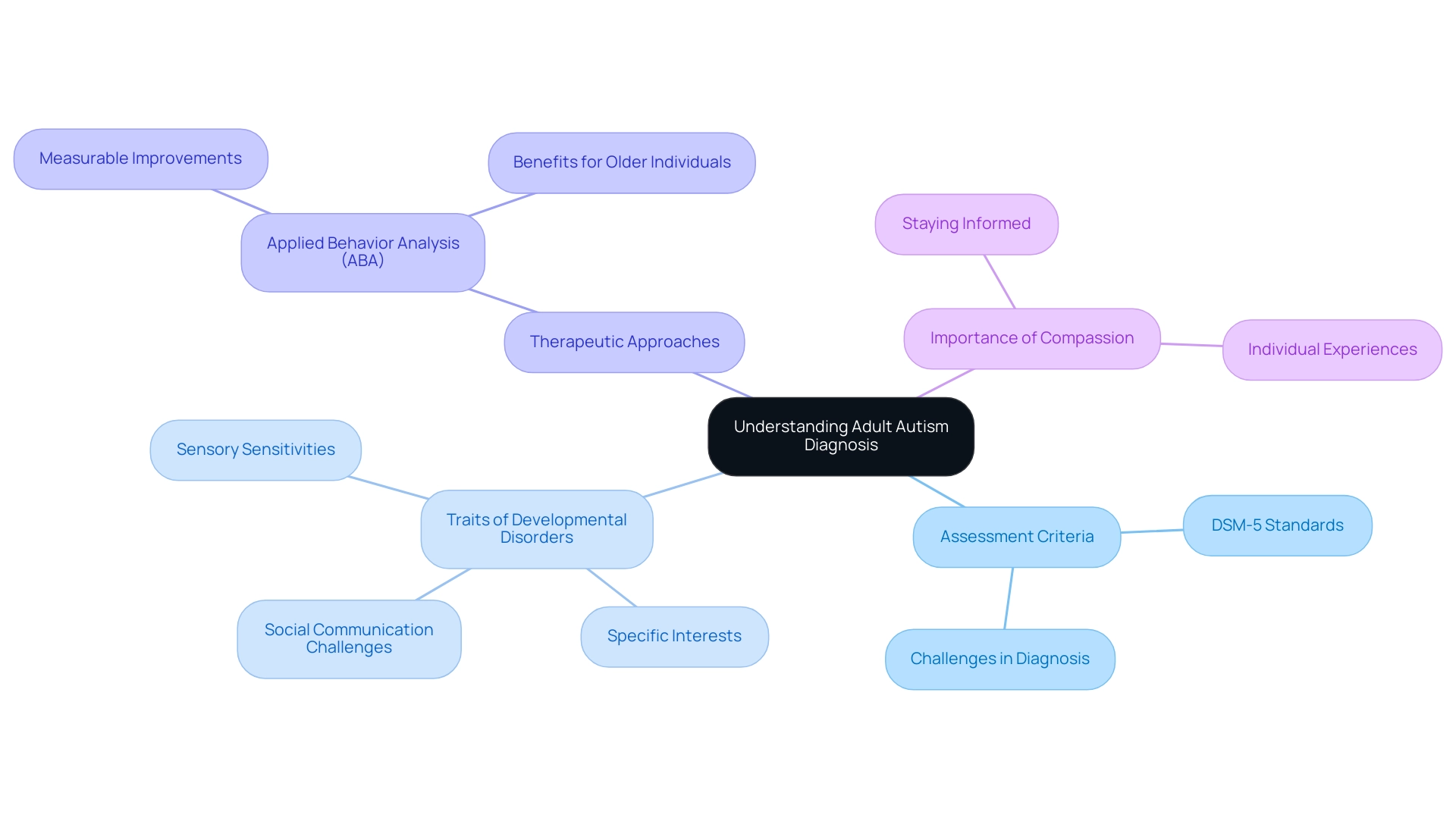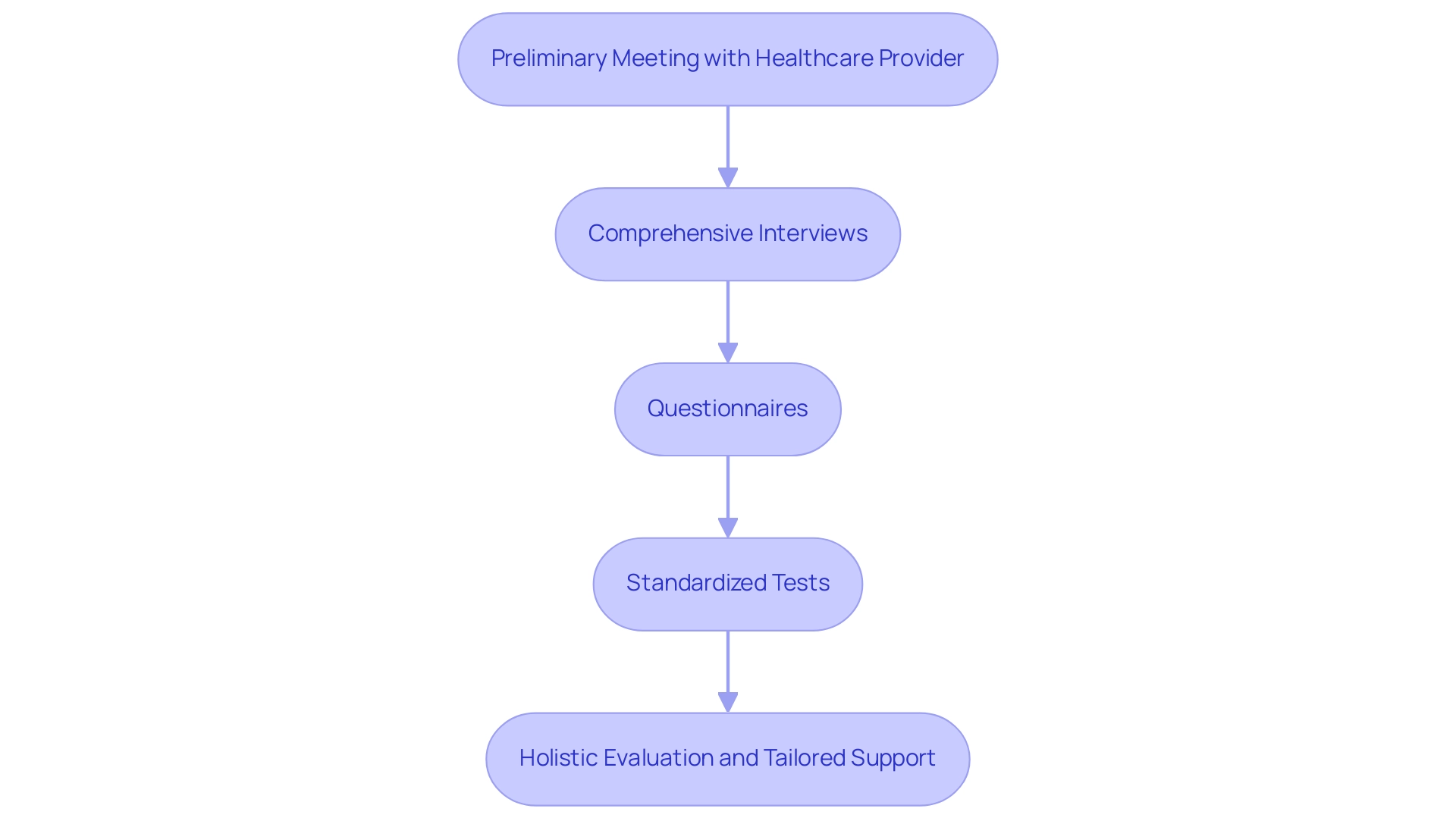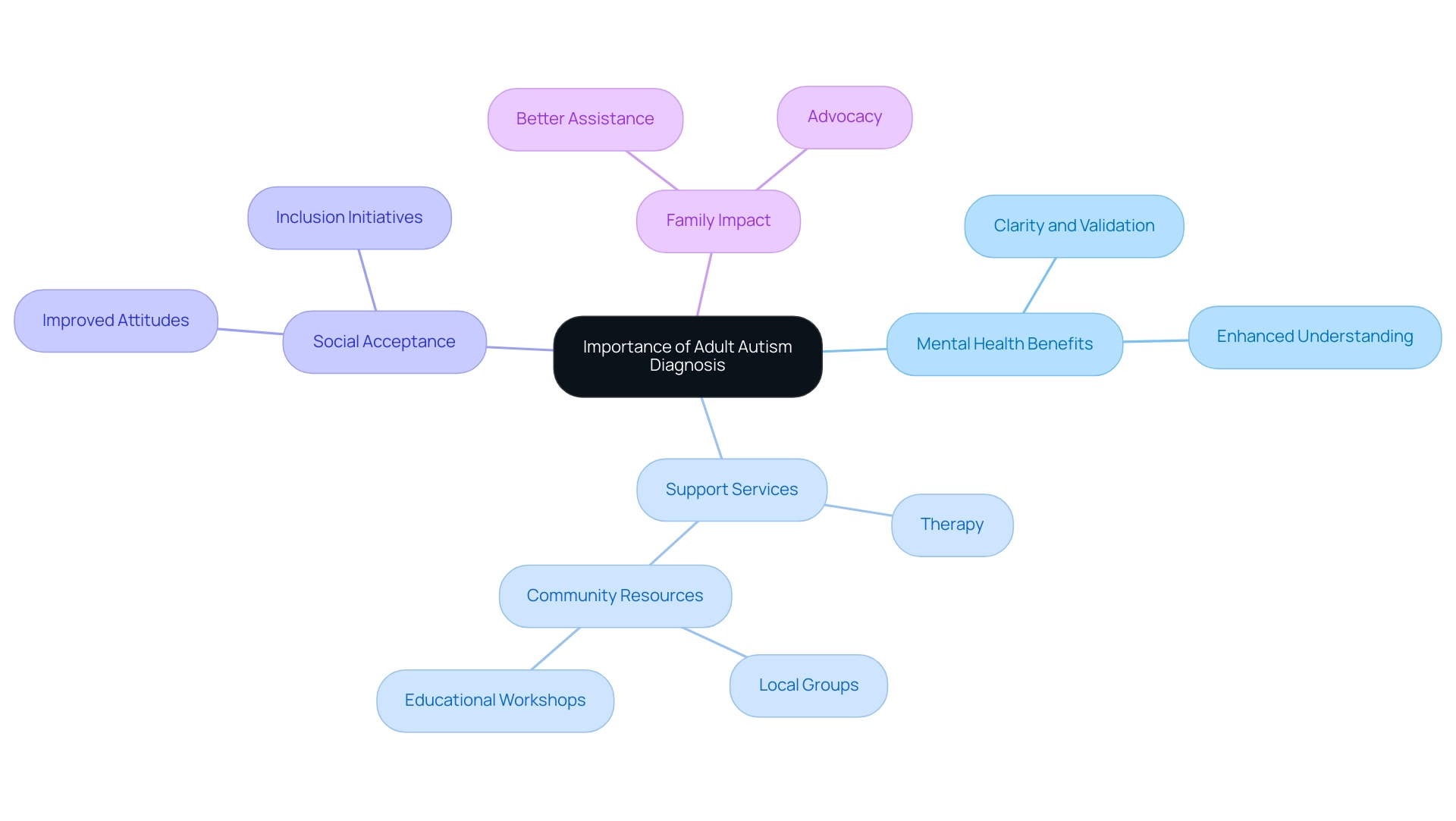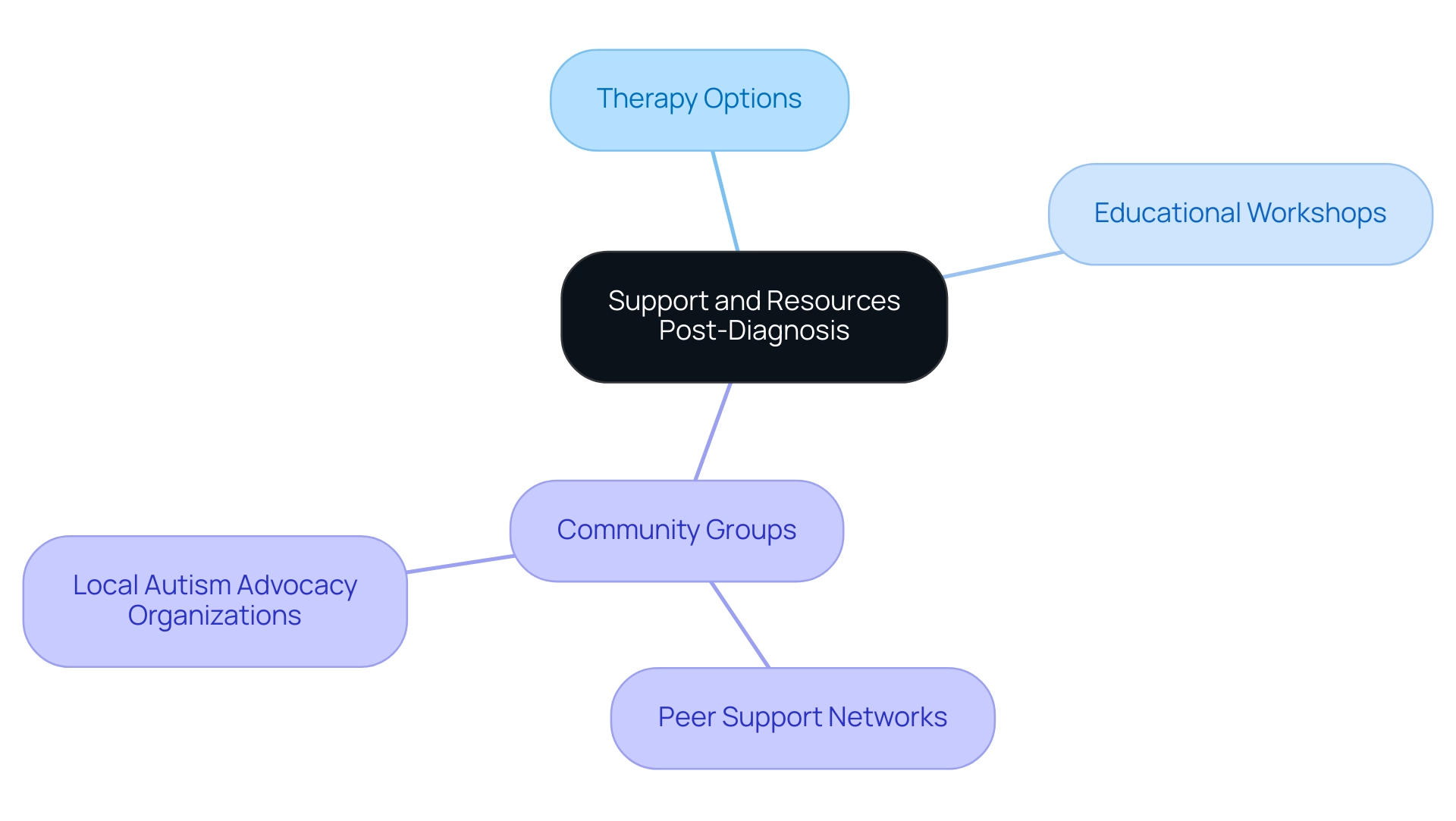Introduction
Navigating the complexities of adult autism can be a daunting journey, yet it is one filled with hope and empowerment. As awareness around autism spectrum disorder continues to grow, more adults are seeking diagnosis and support, uncovering the unique challenges and strengths that come with their experiences. Understanding the nuances of adult autism—ranging from diagnostic processes to the importance of community resources—can provide invaluable insights for individuals and their families.
By embracing this journey with compassion and knowledge, adults on the spectrum can access the support they need to thrive, fostering a sense of belonging and enhancing their quality of life.
Understanding Adult Autism Diagnosis
Identifying this condition in grown individuals requires a comprehensive assessment evaluating conduct, interpersonal interactions, and communication abilities to establish conformity with the DSM-5 standards, which encompass ongoing deficits in interpersonal communication and interaction, limited patterns of behavior, interests, or activities, and symptoms that hinder daily functioning. This comprehensive approach can be particularly challenging for individuals who may have gone undiagnosed in childhood. According to Prospera Healthcare, 'Mild ASD, or Level 1 Autism Spectrum Disorder, presents unique challenges in interpersonal communication and behavior while requiring minimal support.'
Grasping the traits of developmental disorders in adults, such as challenges in interpersonal situations, sensory sensitivities, and specific interests, is essential. For example, individuals may struggle with nuanced social cues or experience overwhelming sensory inputs in everyday environments. Recognizing these traits can help individuals and their families identify potential signs of the condition.
Recent statistics indicate that 36.5% of caregivers for individuals with developmental disorders utilize Applied Behavior Analysis (ABA) therapy, which offers measurable improvements in daily life. The case study 'Benefits of ABA Therapy' highlights this evidence-based approach, demonstrating significant enhancements in the daily lives of children with developmental disorders, and these advantages can also extend to older individuals. This method assists families in navigating treatment options effectively, ensuring comprehensive assistance throughout the diagnosis process.
It's crucial to approach the comprehension of mature developmental disorders with compassion and an open mind, recognizing that each individual's experience with these conditions is distinct. Staying informed about recent studies on characteristics of grown individuals and the latest news on diagnosis rates in 2024 can provide valuable context and support for those navigating this journey.

The Process of Adult Autism Testing
Beginning the process of testing for neurodevelopmental conditions starts with a preliminary meeting with a healthcare provider or psychologist who specializes in this area. This key step sets the stage for a detailed evaluation process, which typically includes:
- Comprehensive interviews
- Questionnaires
- Standardized tests
Gathering information about your developmental history and current functioning is crucial, as it paints a vivid picture of your unique experiences and any challenges you might face daily. Understanding your personal history not only helps clinicians assess your situation but also allows them to tailor their approach to your specific needs, making the evaluation process more effective.
Statistics indicate that the estimated prevalence of autism spectrum disorder (ASD) among individuals aged 18-84 years is 2.21%, translating to roughly 5,437,988 people. These figures highlight the significant number of adults who may benefit from assessment and support. During the evaluation, clinicians may also seek input from family members or close friends to gain a more holistic view of your behavior and social interactions. According to the World Health Organization, this condition affects 1 in every 100 children, underscoring the importance of thorough assessments at all life stages.
It's essential to prepare for this evaluation by reflecting on your personal history and pinpointing specific concerns you wish to address. The process can be extensive, often involving multiple sessions to ensure a comprehensive understanding of your condition. Typically, these evaluations last several hours, spread over a few appointments. Such in-depth evaluations are essential for accurately diagnosing the condition and tailoring support to enhance your quality of life.
Recent research highlights advancements in autism assessment methods, focusing on more refined and accurate diagnostic tools. Current trends indicate a shift towards more personalized and technology-assisted assessments that take into account the unique needs of individuals. Healthcare providers emphasize the significance of early and precise diagnosis, which can open doors to appropriate interventions and support systems. As you navigate this process, know that a thorough and compassionate evaluation is a powerful step towards understanding and advocating for your needs.

The Importance of an Adult Autism Diagnosis
Obtaining an official diagnosis of the condition as a grown individual can be profoundly transformative. Statistics indicate that a considerable number of individuals diagnosed with this condition, especially those without intellectual disabilities, have been recognized in recent years, highlighting the increasing awareness of maturity in this disorder. This diagnosis often brings much-needed clarity and validation for those who have long struggled with social interactions or sensory sensitivities.
Expert opinions highlight that an autism diagnosis in a mature individual can significantly enhance mental health, providing a framework for understanding one's experiences and behaviors. As one individual shared, "Our findings suggest that the reduction in life expectancy experienced by autistic people on average is likely to be substantially less than the widely-reported figure of 16 years." This perspective emphasizes the importance of recognizing the unique experiences of autistic individuals.
Furthermore, case studies indicate that with improved assistance and inclusion, the inequities in life expectancy for autistic individuals can be mitigated. Comprehending their diagnosis can lead to crucial assistance services, including therapy, social skills training, and community resources tailored to their unique needs, such as local groups and educational workshops created for individuals on the spectrum.
This newfound understanding fosters self-acceptance and helps individuals develop coping strategies that enhance their quality of life. For families, a clearer understanding of their loved one's needs enables better assistance and advocacy for appropriate resources, ultimately improving the overall well-being of the entire family.

Accessing Support and Resources Post-Diagnosis
Obtaining an autism diagnosis in adulthood can be a pivotal moment, opening doors to numerous resources tailored to meet individual needs. It's essential to explore local support groups, such as the Autism Society and local chapters of the National Autism Association, which offer a sense of community and shared experiences. Participation in daytime programs, for instance, can significantly reduce the odds of social isolation, as evidenced by data showing that youth in these programs are less likely to never see friends.
Therapy options and educational workshops centered on grown-up conditions are invaluable. Engaging in these programs not only enhances daily living skills but also fosters a supportive network. Online forums such as Wrong Planet and Facebook groups focused on adult autism can further enhance this assistance, offering platforms for shared experiences and advice.
Self-advocacy is crucial. Communicating needs effectively to healthcare providers and family members ensures that the right assistance is in place. Dr. G highlights the importance of community assistance, emphasizing efforts to help organizations embrace families of individuals with disabilities.
Interacting with experts focused on mature individuals with developmental disorders can lead to tailored approaches for managing everyday life and relationships. The case study on Community Involvement of Adults with IDD shows that attending religious services correlates with greater community involvement, illustrating the broader impact of organized assistance and highlighting how attending such services can lead to increased social engagement.
In 2024, a range of assistance networks and resources are available for adults diagnosed with autism spectrum condition. These include:
- Therapy options
- Educational workshops
- Community groups
- Peer support networks
- Local autism advocacy organizations
Expert opinions suggest that these resources are essential for fostering self-advocacy and effective daily management. Exploring these options can lead to a more fulfilling and connected life.

Conclusion
Navigating the journey of adult autism diagnosis and support is a vital process that can significantly enhance the quality of life for individuals on the spectrum. Understanding the complexities of diagnosis, from the thorough evaluation methods to the importance of recognizing unique characteristics, lays the foundation for effective support. A formal diagnosis not only brings clarity but also opens doors to essential resources and community connections that foster a sense of belonging.
Accessing tailored resources, such as local support groups and specialized therapies, empowers individuals to develop coping strategies and enhance their daily living skills. Engaging in community programs can reduce feelings of isolation and promote social interactions, which are crucial for mental health and overall well-being. Furthermore, effective self-advocacy ensures that individuals can communicate their needs, leading to more personalized and effective support.
Ultimately, embracing the journey of adult autism with compassion and informed understanding can transform lives. By highlighting the unique strengths and challenges faced by adults on the spectrum, families and communities can work together to create an inclusive environment that nurtures growth and self-acceptance. As awareness and resources continue to expand, there is hope for a brighter future where every individual on the autism spectrum can thrive and contribute meaningfully to society.




